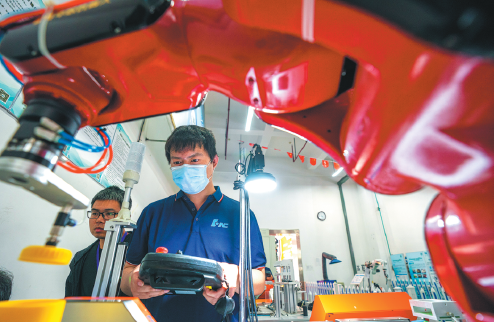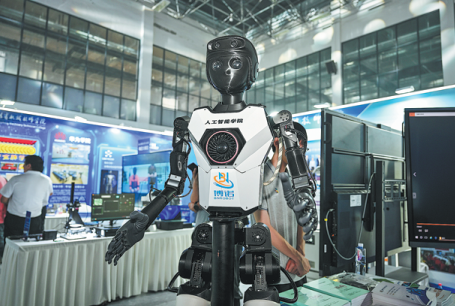
The rapid rise of artificial intelligence as a discipline is reshaping China's higher education landscape, with universities scrambling to adapt to national strategies and industry demands.
Since 2018, when the first 35 Chinese universities introduced undergraduate AI programs, the field has exploded. As of this year, over 626 institutions nationwide offer AI-related degrees, however, educators have shown a mix of enthusiasm and caution with regard to balancing quality and quantity.
Since the State Council, China's Cabinet, outlined its three-step AI development plan in 2017, national and local policies have prioritized AI innovation. The Ministry of Education's 2022 decision to categorize intelligent science and technology as a first-tier interdisciplinary discipline further institutionalized AI education.
Changsha University of Science and Technology's School of Artificial Intelligence, established in January in Changsha, Hunan province, epitomizes this trend.
Dean Fan Shaosheng explained that the school was created by merging automation, robotics and AI programs to foster interdisciplinary talent. "Our goal is to serve regional economic development and industries such as transportation, power and water conservancy, aligning with Hunan's development strategy," he said.
The school's "undergraduatemaster's-doctorate" integrated model shortens training cycles for top students while emphasizing innovation. With 60 faculty members — 80 percent of which hold PhDs — and 1,400 undergraduates and 280 graduate students, the school leverages policy incentives, industry collaboration and dynamic curriculum updates to maintain educational quality, he said.
Employment prospects remain a key driver. Fan noted that 90 percent of the school's AI and automation graduates secured jobs, outperforming institutional averages. The dean highlighted the "high demand, salary premiums and diverse applications" for AI, but stressed the importance of aligning personal aptitude with professional choice. "Strong math, logic and a passion for technology are prerequisites," he said.
ALSO READ: Artificial intelligence usage on student theses debated
At Beijing Jiaotong University, the integration of AI into traditional engineering reflects a broader shift. Liu Yueming, vice-dean of the School of Mechanical, Electronic and Control Engineering, detailed how programs like intelligent vehicle engineering and robotics engineering have emerged from upgrades to meet smart manufacturing and rail transit demands.
"High-speed trains are now intelligent entities, requiring expertise in AI-driven design and maintenance," he said. The school's four AI-related majors, enrolling 320 students annually, blend mechanical engineering with AI, big data and the internet of things. With a 70 percent postgraduate enrollment rate and 97 percent employment rate, graduates often join State-owned enterprises like China Railway and CRRC Corporation, he said.
Industry alignment remains critical. The university has revamped its curriculum to emphasize cross-disciplinary foundations, delaying specialization until junior year to broaden student adaptability, Liu said. This approach, combined with hands-on innovation platforms and industry-linked research, ensures graduates meet labor market needs.
Zhang Haibin, a mechanical engineering student at Beijing Jiaotong University and a robotics enthusiast, highlighted the program's interdisciplinary rigor. "Robotics isn't just stacking disciplines — it's integrating hardware, algorithms and control systems," he said. His team's yam planting robot, developed through coursework and competitions, exemplifies practical skills prized by employers.
He said robotics competitions and industry projects bridge theory and practice. Zhang credits contests like the National Undergraduate Mechanical Innovational Competition with sharpening his skills.
The greatest appeal of studying robotics engineering lies in handson practice. Whether in research or competitive events, students have numerous opportunities to engage in practical work — building a learning framework from scratch, replicating the latest models for robots or robotic dogs, or starting with a simple circuit board and a handful of screws to ultimately create a functioning robot, he said.
"Through these experiences, you are bound to discover your passion, whether it be mechanical design, embedded systems development, deep learning, reinforcement learning, or other areas. Driven by these interests, you will dive deeper into specialized fields, continually expanding your expertise," he said.

Beijing University of Technology launched its AI undergraduate program in 2020 and introduced an experimental AI class this year. Designed to bridge the needs of academia and industry, the program emphasizes foundational knowledge, technical innovation and interdisciplinary research, according to Yin Baocai, program director and a professor at the university's School of Information Science and Technology.
The inaugural class of 2021 boasted a 55 percent postgraduate advancement rate, with others securing roles at tech firms such as Lenovo and State Grid Beijing, he said.
To address the AI talent gap, the university integrates internships, corporate collaborations and competitions into its training model. For instance, the "engineering master forum" invites industry experts to deliver lectures, while projects in smart transportation and environmental systems simulate real-world problem-solving, he said.
Yin predicts AI will drive breakthroughs in healthcare, robotics and scientific research. Despite the field's popularity, he emphasized that program applicants require strong logical thinking and programming aptitude to avoid "bandwagon" enrollment.
AI majors have become synonymous with "high salaries" and "strong employability".
With computer science and AI-related disciplines dominating the list of the top 10 most popular majors, a severe talent shortage persists, with China's AI workforce gap exceeding 5 million, according to the Ministry of Human Resources and Social Security.
Salaries reflect the competition. Top AI graduates from elite universities command annual packages of 600,000 to 1 million yuan ($84,000 to $140,000), while entry-level AI trainers in Hubei province earn a monthly median salary of 7,800 yuan. Regional disparities exist: Beijing, Shanghai, Shenzhen in Guangdong province and Hangzhou in Zhejiang province lead with average monthly salaries of 18,000 yuan, followed by second-tier cities like Suzhou in Jiangsu province at 14,000 yuan, according to Haibao News, a news portal based in Shandong province.
READ MORE: Pioneering university cultivating top-tier talent in AI
However, companies still struggle to recruit qualified personnel. A Shandong-based AI firm executive noted that even offers of 30,000 yuan per month often fail to attract ideal candidates. At a Beijing recruitment fair in May last year, 53 companies offered 794 AI-related positions, drawing nearly 600 applicants.
Nationally, China's AI core industry is valued at almost 600 billion yuan, with over 4,500 enterprises spanning chips, algorithms and applications. With generative AI users hitting 230 million by the middle of last year, experts warn that bridging the talent gap remains critical to sustaining China's AI leadership.
Despite the optimism, concerns about program inflation persist. Since 2018, hundreds of universities — including vocational schools — have hastily launched AI programs, often lacking faculty or infrastructure.
Xu Li, a student at a less reputable university in Zhejiang, told China Newsweek how her computer science cohort rushed to switch to AI when the program launched. "I followed the crowd without thinkingit sounded futuristic," she admitted.
Wu Fei, a professor at Zhejiang University, attributes this craze to societal transformation. "Humanity is entering an intelligent era. Without AI, there's no 'intelligence'. Students fear being left behind, especially after breakthroughs like ChatGPT."
Dean Fan from Changsha University of Science and Technology cautioned against "cold employment for hot majors" if institutions prioritize enrollment over quality. "Avoid setting up programs just for admissions," he warned, urging schools to emphasize unique strengths.
Meng Yu earned his bachelor's degree in information engineering from a well-known university in China, later pursuing studies in computer vision in Australia. After completing his PhD, he returned to China and has been teaching computer vision theory at a university in Fujian province.
He told China Newsweek that computer vision is an applied field of artificial intelligence. He said candidly that only top-ranked computer science universities possess the faculty resources and student caliber necessary to support rigorous AI undergraduate programs, urging prospective students to choose carefully.
In his view, the core of AI education lies in computer science and mathematics.
For average students, mastering even one of these disciplines in four years is challenging enough. To excel in AI, however, students need stronger mathematical foundations than typical engineering majors and must undergo repeated training in computer engineering, AI algorithms and application scenarios, he said.
Completing such comprehensive training at the undergraduate level is highly difficult, he noted, as each component risks becoming superficial, resulting in a "jack of all trades, master of none" outcome.
Contact the writer at zoushuo@chinadaily.com.cn


